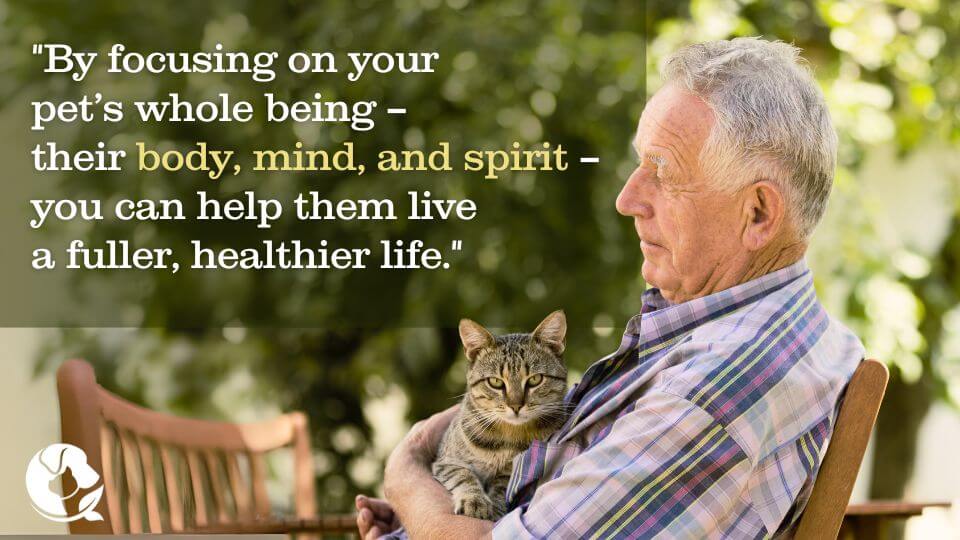As I sit here writing this, my kitty, Tigger, is curled up at my feet. At 15 years young, she’s not as spry as she once was, but her purr is as loud as it was when she was a kitten. Tiggy has been my faithful companion through many of my own health challenges, and like many aging pets, she’s slowing down and sleeping more. But thanks to the whole-listic approach we’re about to dive into, she’s living a vibrant, happy life. It’s experiences like these with Tiggy, and the many patients I’ve treated over the years, that have shown me the power of a whole-istic approach to pet wellness.
Why Traditional Pet Treatment Often Falls Short
You know, for years, we vets have been taught to zero in on symptoms—the stuff we can see and measure. Medications and surgeries have their place, no doubt. But let me tell you, there’s so much more to your pet’s health than what shows up on a chart.
Ever wondered why your cat still seems off, even after a round of anti-biotics? Or why your dog’s arthritis meds don’t seem to be doing the trick anymore? You’re not alone. There’s a growing understanding that real healing goes beyond just managing symptoms. It involves treating the whole animal—their body, mind, and even their spirit.

Understanding Holistic Veterinary Medicine: Where Science Meets Traditional Wisdom
Holistic care blends modern science with time-tested indigenous wisdom. Take the discovery of the microbiome and mitochondrial health, for example. These tiny elements inside your pet’s body play a huge role in keeping them healthy. Mitochondria are like tiny batteries inside their cells, powering everything from their energy levels to their immune response. When those batteries run low, it’s no wonder your pet starts feeling off.
On top of that, ancient practices like herbal medicine, energy healing, and acupuncture have been helping animals heal for centuries. By combining these two worlds—scientific advances and age-old wisdom—we can take a truly whole-istic approach to health.
Cellular Health: The Key to Your Pet’s Vitality
So how can you support your pet’s health on a deeper level? It’s all about helping those tiny batteries—mitochondria—function at their best. Here are a few practical steps:
- Veterinary Homeopathy, Acupuncture and other Energy Therapies: These methods, like Reiki or Healing Touch for Animals, smooth the flow of energy in your pet’s body, helping them feel better from the inside out.
- Supplements: Adding antioxidants, Mitoguard, PQQ and CoQ10 to your pet’s diet can give their cells the boost they need to keep those mitochondria working.
- Cold and Light Therapies: Ever heard of red light therapy or hyperbaric oxygen therapy (HBOT)? These can improve circulation and help your pet’s cells use oxygen better, improving their energy levels.
But remember, it’s not all about the physical side. Indigenous wisdom reminds us that healing also involves emotional and energetic balance. Practices like herbal medicine and intuitive communication can help address underlying imbalances that might be affecting your pet.
 BEAM Method: The Revolutionary Way to Monitor Your Pet’s Health
BEAM Method: The Revolutionary Way to Monitor Your Pet’s Health
Here’s the thing: rather than focusing solely on symptoms, it’s helpful to look at your pet’s BEAM—Behavior, Energy, Appetite, and Mood. These four areas give you a fuller picture of how your pet is really doing.
- Behavior: Are they engaging with their environment, or are they withdrawing?
- Energy: Do they still greet you at the door or prefer to lie down most of the day?
- Appetite: Are they excited about their meals, or are they leaving food in the bowl?
- Mood: Are they content and relaxed, or do they seem anxious or stressed?
When your pet has high BEAM, it’s a good sign that they’re thriving, even if they’re dealing with a health challenge.
Holistic Treatment Success Stories: Real Pets, Real Results
Let me share a couple of case stories that show the power of holistic healing.
Take Bella, a 10-year-old Lab with arthritis. She was on medication, but her mobility was still declining. We added in acupuncture, supplements like omega-3s, and a fresh food diet. Within a few months, Bella was running around like she hadn’t in years. Her guardian couldn’t believe the transformation.
Or there’s Max, a 12-year-old kitty with chronic kidney disease. Emily, his guardian, wasn’t happy with the traditional treatment options, so we tried something different. We combined herbs like Rehmannia with Reiki energy healing. Max not only lived well beyond his prognosis, but he also had more energy, was eating better, and seemed more content.
Taking the First Steps Toward Whole-istic Care
If this all seems a bit overwhelming, don’t worry—you can start small. Maybe try adding some fresh foods to your pet’s diet or book an acupuncture session. You don’t have to make all the changes at once. Take it slow, and pay attention to how your pet responds.
- Start Slowly with Dietary Changes: Begin by mixing small amounts of fresh food into their regular meals and gradually increase.
- Introduce Therapies Step-by-Step: Try one or two treatments, like acupuncture or homeopathy, and see how your pet reacts.
- Listen to Your Pet: Every pet’s wellness journey is unique, so keep an eye on their BEAM and let them guide you.
- Add a Veterinary Homeopath or Whole-istic Veterinarian to Your Pet’s Team: Partner with a veterinarian experienced in truly holistic care. They can provide personalized recommendations and monitor your pet’s progress, ensuring that changes are safe and effective.
A Personal Note
Look, I know this might seem like a lot at first. But trust me, I’ve seen the difference this approach can make. By focusing on your pet’s whole being—their body, mind, and spirit—you can help them live a fuller, healthier life. We’re in this together, and I’m here to support you every step of the way.
Here’s to a new year filled with wagging tails, contented purrs, and the joy of seeing your pet thrive!

Dr. Jeff
Jeffrey Feinman, BA, VMD, CVH, graduated in 1985 from the University of Pennsylvania and was Penn’s first veterinary dual-degree University Scholar, holding both molecular biology and veterinary degrees. He is the founder of HolisticActions.com and dedicated to pet parent empowerment.
Dr. Jeff is devoted to researching about how to harness the innate power of the individual using Vitality and Balance. He and his wonderful wife Amy live with Maya, a rescue pup, a Rex cat named Tigger and Savannah cat Aviva.
